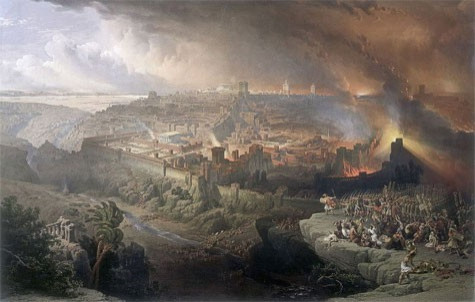Jerusalem Tunnel Discovery: Artifacts Unearthed from Ancient War

A series of artifacts discovered in an ancient drainage tunnel under Jerusalem are said to be remnants of a war fought nearly 2,000 years ago, according to archeologists.
Archeologists said Monday that the finds, including a sword, oil lamps, clay pots, a bronze key and coins, were abandoned during a pivotal episode in the city's history around 70 A.D., when the Romans razed the second biblical Jewish Temple and much of Jerusalem in the process.
Accounts of the battle, most notably those of Flavius Josephus, the Jewish rebel general turned Roman soldier, state that the rebels fled to tunnels in a futile attempt to escape as the city fell.
Josephus wrote that as the city burned, the rebels decided to lie in the tunnels and wait until the legions had departed, whereupon they'd emerge and escape.
Yet, history played out differently, and the legionnaires tore up the paving stones above the drainage channels, exposing those hidden below.
In earlier digs, archaeologists found traces of people who lived in the drainage channels in hiding.
Built two millennia ago under one of Roman-era Jerusalem's main streets, the tunnel today lies under a predominantly Arab neighborhood in the city's eastern sector. It is part of a network of subterranean passages under the city.
Israel's Antiquities Authority announced the finding of the rare Roman sword on Monday. Professor Ronny Reich, head of the Department of Archaeology of Haifa University, told CNN that the sword probably belonged to a Roman infantryman stationed in Jerusalem during the Revolt
The 24-inch (60cm) sword was found in its leather scabbard and is the third discovered in Jerusalem. The find is notable because it is one of the best-preserved swords of its type with elaborate decoration.
Last month, workers unearthed a tiny golden bell that could still ring 2,000 years later.
The find comes on the eve of Tisha B'Av, which is a fast day in Judaism that commemorates the destruction of both the First and Second Temples in Jerusalem. The tunnels remain a sensitive political issue in Israel. While Israelis use the finds as proof of the extent of Jewish roots there, for many Palestinians, they are seen as a threat to their own claims to the city and an exaggerated emphasis on Jewish history.
© Copyright IBTimes 2025. All rights reserved.






















